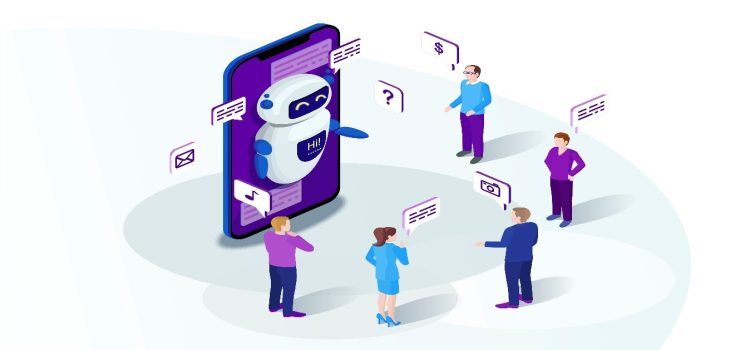
How AI is Transforming Customer Service
In the digital age, customer service has become a crucial determinant of business success. With consumers expecting instant responses and personalized interactions, companies are increasingly turning to artificial intelligence (AI) to meet these demands. The integration of AI in customer service is not just a trend but a transformative force reshaping how businesses interact with their customers. This article delves into the various ways AI is revolutionizing customer service, focusing on key areas such as chatbots, predictive analytics, and personalized experiences.
Chatbots: The Frontline of AI in Customer Service
One of the most visible applications of AI in customer service is the use of chatbots. These AI-powered virtual assistants are designed to simulate human conversation and can handle a wide range of customer inquiries. Chatbots are available 24/7, providing immediate responses to customer questions, which significantly reduces wait times. This constant availability not only enhances customer satisfaction but also allows human agents to focus on more complex issues that require a personal touch.
Chatbots have evolved from simple, rule-based systems to sophisticated AI-driven entities capable of understanding natural language and context. Advanced chatbots utilize natural language processing (NLP) and machine learning algorithms to comprehend and respond to customer queries more accurately. They can handle multiple languages, recognize customer intent, and even detect sentiment, providing a more nuanced and effective customer service experience.
Predictive Analytics: Anticipating Customer Needs
Predictive analytics is another powerful tool in the AI arsenal that is transforming customer service. By analyzing vast amounts of data, AI can predict customer behavior and preferences, enabling businesses to anticipate needs and proactively address issues. For instance, predictive analytics can identify patterns in customer interactions, such as frequent complaints about a particular product feature, allowing companies to address the problem before it escalates.
Moreover, predictive analytics can help in personalizing the customer experience. By understanding individual customer preferences and behaviors, companies can tailor their interactions and offerings to meet specific needs. This level of personalization not only enhances customer satisfaction but also fosters loyalty and long-term engagement.
Personalized Experiences: The New Standard
In today’s competitive market, personalization is no longer a luxury but a necessity. AI enables businesses to deliver highly personalized customer experiences by analyzing data from various touchpoints, including past interactions, purchase history, and browsing behavior. This data-driven approach allows companies to create customized marketing campaigns, product recommendations, and customer service interactions.
For example, AI can help in creating personalized email campaigns that address customers by name and offer products or services based on their previous purchases. Similarly, AI-driven recommendation engines can suggest products that align with a customer’s preferences, increasing the likelihood of a purchase. This level of personalization not only enhances the customer experience but also drives sales and revenue growth.
Enhancing Human Agents: The Synergy of AI and Human Intelligence
While AI is transforming customer service, it is not about replacing human agents but augmenting their capabilities. AI can handle routine and repetitive tasks, freeing up human agents to focus on more complex and emotionally charged interactions. This synergy between AI and human intelligence leads to a more efficient and effective customer service operation.
AI tools can assist human agents by providing real-time information and insights during customer interactions. For instance, AI can analyze a customer’s tone and sentiment during a call and suggest appropriate responses to the agent. Additionally, AI can provide agents with a comprehensive view of the customer’s history and preferences, enabling them to offer more personalized and relevant assistance.

Reducing Operational Costs: Efficiency and Scalability
One of the significant advantages of integrating AI into customer service is the reduction in operational costs. AI-powered solutions, such as chatbots and virtual assistants, can handle a large volume of inquiries simultaneously, reducing the need for a large customer service team. This scalability allows businesses to manage peak times and high volumes of customer interactions without compromising on service quality.
Moreover, AI-driven automation can streamline various customer service processes, such as ticket routing, issue resolution, and follow-ups, leading to increased efficiency and cost savings. By automating routine tasks, businesses can allocate resources more effectively and focus on strategic initiatives that drive growth and innovation.
Challenges and Considerations
While the benefits of AI in customer service are significant, there are also challenges and considerations that businesses must address. One of the primary concerns is data privacy and security. With AI systems relying heavily on customer data, ensuring the protection of this data is paramount. Businesses must implement robust security measures and comply with data protection regulations to maintain customer trust.
Another challenge is the potential for AI to make errors or misinterpret customer queries. While AI has made significant advancements, it is not infallible. Businesses must have mechanisms in place to handle situations where AI may fall short and ensure a seamless transition to human agents when necessary.
The Future of AI in Customer Service
The future of AI in customer service is promising, with continuous advancements in technology and increasing adoption across industries. As AI systems become more sophisticated, we can expect even greater levels of automation, personalization, and efficiency. Emerging technologies, such as conversational AI, augmented reality (AR), and virtual reality (VR), are likely to further enhance the customer service experience.
In conclusion, AI is undeniably transforming customer service by providing faster, more personalized, and efficient interactions. From chatbots and predictive analytics to personalized experiences and enhanced human-agent collaboration, AI is reshaping the way businesses engage with their customers. As companies continue to embrace AI, the focus will be on leveraging its capabilities to deliver exceptional customer experiences while addressing challenges and ensuring data privacy and security. The synergy between AI and human intelligence will be the driving force behind the future of customer service, setting new standards of excellence and innovation.








